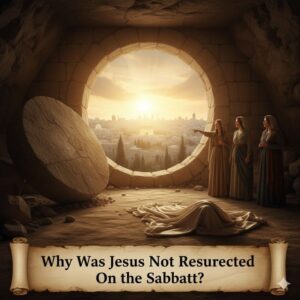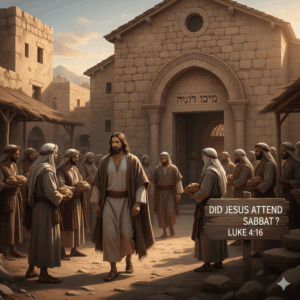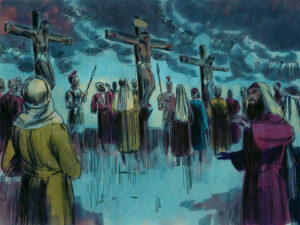Among Jesus’ many remarkable claims during His earthly ministry, one stands out for its theological depth and its practical implications: “The Son of Man is Lord of the Sabbath.”
This phrase, recorded in all three Synoptic Gospels (Matthew 12:8, Mark 2:28, and Luke 6:5), encapsulates both Jesus’ authority and His ultimate purpose in fulfilling and reorienting the understanding of the Sabbath.
Far beyond a simple statement about weekly observance, this declaration engages with deep questions of divine authority, human well-being, and the intention behind God’s Law.
Understanding what it means for Jesus to be “Lord of the Sabbath” helps Christians grasp who Jesus is and how He reshapes the religious life of His followers.
Biblical Context: Sabbath Controversies
The Disciples Pluck Grain
The context for Jesus’ claim begins with a series of disputes between Him and the religious leaders over proper Sabbath observance.
The Sabbath, rooted in the Ten Commandments, was set apart as a holy day of rest, modeled after God’s rest on the seventh day of creation (Genesis 2:2-3; Exodus 20:8-11).
By the time of Jesus, however, numerous additional rules and interpretations had been layered upon the original command, turning the Sabbath into a time of rigorous restriction rather than joyful rest.
In one episode (Matthew 12:1-8, Mark 2:23-28, Luke 6:1-5), Jesus and His disciples are walking through grain fields on the Sabbath.
The hungry disciples begin to pluck heads of grain, rub them in their hands, and eat.
Observant Pharisees immediately challenge Jesus, accusing His followers of unlawful behavior—harvesting, threshing, and preparing food, all prohibited by their interpretation of Sabbath law.
Jesus responds not with a denial, but with a lesson: He recalls how David and his companions ate the consecrated bread, reserved only for priests, when they were hungry, underscoring that mercy and human need outweigh ritualistic regulation.
The Healing in the Synagogue
In another incident (Mark 3:1-6, Matthew 12:9-14, Luke 6:6-11), Jesus enters a synagogue on the Sabbath and encounters a man with a withered hand.
The Pharisees, looking for grounds to accuse Him, watch closely to see if He will heal on the Sabbath.
Jesus, perceiving their hearts, calls the man forward and asks, “Is it lawful on the Sabbath to do good or to do harm, to save life or to kill?”
He then heals the man, illustrating by His actions that compassion should never be limited by legalistic boundaries.
The religious leaders, instead of rejoicing, react with hostility—beginning to plot how they might destroy Him.
The Meaning of Jesus’ Claim: “Lord of the Sabbath”
Authority and Divinity
When Jesus says, “The Son of Man is Lord of the Sabbath,” He is making an extraordinary statement about His own authority.
The Sabbath was instituted by God Himself in creation, then commanded unequivocally in the Law of Moses.
To claim lordship over it is to claim the authority to interpret, and if necessary amend, the rules that surround it.
This was a role only God could rightfully fill—so Jesus’ words are a clear affirmation of His divinity.
He is not merely a wise teacher, but the very One who gave Israel the Sabbath command in the first place.
The Sabbath for Humanity’s Benefit
In Mark’s account, Jesus reinforces His message: “The Sabbath was made for man, not man for the Sabbath” (Mark 2:27).
This phrase is profound. God did not create Sabbath restrictions for their own sake, or to burden humanity with endless rules. Instead, He gave the Sabbath as a gift—a time for rest, renewal, worship, and mercy.
By healing on the Sabbath and allowing His disciples to eat when hungry, Jesus demonstrates that doing good and meeting essential needs are entirely consistent with the Sabbath’s original purpose.
His actions reorient the day from a legalistic requirement to a celebration of God’s concern for human well-being.
Fulfilling, Not Abolishing, the Law
Jesus didn’t come to abolish the Law but to fulfill it (Matthew 5:17). His ministry was about uncovering the fullness of God’s intention behind every commandment.
The Sabbath controversies show this in action: by prioritizing human need and acts of mercy, Jesus points people back to God’s heart.
The Law, at its core, was always meant to bring life and blessing, not to constrict or oppress.
Through His teaching and actions, Jesus calls His followers to move beyond rigid rule-keeping, embracing instead the spirit of compassion and rest that the Sabbath was meant to foster.
Impact and Response
Direct Challenge to Religious Authority
The implications of Jesus’ claim were massive for the religious authorities of His day. To suggest that the Sabbath regulations could be set aside—or even redirected—by anyone other than God Himself was unthinkable.
The Pharisees had built much of their authority and identity around enforcing the Law and their added traditions.
When Jesus challenged the very basis of their religious practice, He undermined not just their interpretation of the Sabbath, but their entire system of spiritual authority.
Jesus’ approach was not to undermine the holiness of the Sabbath, but to rescue it from lifeless legalism, restoring its God-given purpose as a day of rest and mercy.
His teaching forced a decision: would people follow human traditions, or would they embrace the deeper values of God’s kingdom, as revealed by the Lord of the Sabbath Himself?
Escalation Leading to Persecution
The controversies over the Sabbath did not merely result in theological debate; they sparked animosity and opposition that would ultimately lead to Jesus’ crucifixion.
The Gospels record that after the healing in the synagogue, the religious leaders “went out and immediately held counsel with the Herodians against him, how to destroy him” (Mark 3:6).
Jesus’ boldness in challenging their traditions, and especially His open assertion of divine authority, became focal points of the drive to eliminate Him.
This opposition highlights the tension between true obedience to God and the comfort of human tradition.
Over and over, Jesus exposes how easily religious rules, even those based on Scripture, can become ends in themselves—oppressing people and obscuring God’s heart for mercy and justice.
Conclusion
In claiming authority over the Sabbath, Jesus identifies Himself as the divine lawgiver who invites His followers not just to outward observance, but to enter into a deeper kind of rest—one marked by compassion, freedom, and intimacy with God.
For Christians today, this teaching has enduring relevance. It calls us to examine our own spiritual practices: Are they life-giving, rooted in God’s character, and aimed at blessing others?
Or have they become burdens, driven by fear, pride, or the approval of others?
The Lord of the Sabbath invites all who labor and are heavy laden to come to Him for rest (Matthew 11:28).
In Jesus, we find the true Sabbath—a rest not just of body, but of soul, where the love and mercy of God are brought to life.
As we honor Jesus as Lord, may our every day—even our resting—bear witness to His grace, compassion, and power.
My Letter To A Sunday Keeper – Sabbath Documentary

The Days of Noah – Powerful Documentary (Video Format)

Bible Studies – Written Format







